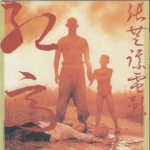Background
Mo Yan was born in 1955, in Gaomi County in Shandong province to a family of farmers, in Dalan Township.

Mo Yan was born in 1955, in Gaomi County in Shandong province to a family of farmers, in Dalan Township.
He left school during the Cultural Revolution to work, first in agriculture and later in a factory
He was forced to drop out the primary school because of China's Cultural Revolution. He was sent to the countryside where he had to perform manual labor for many years first in agriculture and later in an oil factory.
1976 - Mo joined the PLA (China's People's Liberation Army) and held the posts of monitor, librarian, teacher and secretary.
1981 - he started his writing career and published several early works such as "Dry River,""Autumn Stream"and "Folk Music."
1986 - he graduated from the department of literature at the PLA Academy of Arts.
1991 - Mo was granted a master's degree in literature and art from the Lu Xun Literature Institute at Beijing Normal University.
1997 - his full-length novel "Big Breasts and Wide Hips" won the Da Jia Literature Prize, a money prize of 100,000 Yuan. Mo then left the army and started to work for regional newspaper Procuratorial Daily. He also wrote TV scripts for the department of film and television.
2000 - his novel "Family Stories of Red Sorghum"was on the list of the 100 best Chinese fictional works of the 20th century, as selected by Asia Week.
2001 - "Sandalwood Penalty" was awarded with the prize of the "Best Literary Book for Readers," granted by Taiwan United Daily News.
2006 -His first chapter book "Fatigue of Life and Death"got him the Fukuoka Asian Culture Award.
July 2007 - his collection of essays "Say It, Mo Yan", a representation of his spiritual journey, was published.
2008 - "Fatigue of Life and Death"won first prize at the second Dream of the Red Chamber Awards.
Mo was appointed guest professor at the Qingdao University of Technology and was also selected to act as vice- chairman of the Chinese Writers' Association on November 2011.
The Nobel Prize in Literature for 2012 was awarded to Mo Yan, "who with hallucinatory realism merges folk tales, history and the contemporary," the Swedish Academy announced in Stockholm on October 11, 2012.
His writing is powerful, visual, and broad, dipping into history, fantasy and absurdity to tell stories of China and its people – many have seen the influence of Gabriel García Márquez in his writing. Originally counted a part of the "root-seeking" literary movement of the 80s, it quckly became clear that Mo Yan had a style and voice all his own. He is often regarded as the Chinese writer with the most potential to appeal to an international audience.
Mo writes in an exuberant, energetic, and highly metaphorical style about many visceral pleasures. His characters are often loquacious and satirical, capable of raunchy humor.

A film based on his novel “Red Sorghum” and directed by Zhang Yimou, was one of the most internationally acclaimed Chinese films, seen by millions.
He writes a mixture of realism and magical realism. Earlier works were more historical, but as his career has developed, the stories have become more elaborate, more complicated and more unusual.
In 2000, his novel "Family Stories of Red Sorghum"was on the list of the 100 best Chinese fictional works of the 20th century, as selected by Asia Week.,The Language and Cultural Press under Ministry of Education decided to add one of Mo's novella "A transparent carrot" in high school textbooks a couple of days after the annoucement for Mo's winning as the literary laureate.
He took the second place in the 2012 Chinese Writers Rich List that was released on November 29, 2012, having earned 21.5 million yuan ($3.45 million) in royalties. It is the first time Mo has made the annual list since 2006, when he was ranked 20th.
Mo Yan was asked whether he was political when he was at the London Book Fair. His response was: 'Of course I care about politics, and I write about things that I see that I think are wrong - but I also think that the writer should not just be a political activist, a writer should be a writer, first and foremost'.
Mo has strenuously avoided antagonizing the Communist Party during much of his career, and had been criticized before the award by some democracy activists who said he was too subservient to the regime.
Mo Yan has chosen to co-operate with authorities, something underscored by the government's sponsorship of a symposium in his hometown dedicated to his novel Frog. He is critically acclaimed for his work and faulted for his tolerance of government censors.
Quotations: "Literature can overcome the barriers that separate countries and nations"
He's married and has a son.
